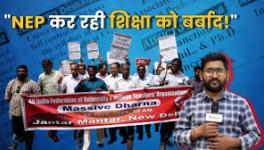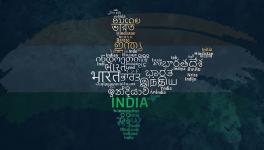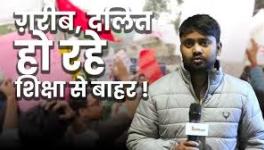Dim Lights, Closed Blinds: History Lessons From a Party in Power

Representational image.
The political domination of the Bharatiya Janata Party (BJP) is progressing in unison with a slide in the standards of education. A new education policy is in the works but it appears that the curriculum and future fields of research are being fixed by the outpourings of the ruling party’s leaders.
The minister of Human Resource Development (HRD) Ramesh Pokhriyal “Nishank”, at a recent meeting of educationists, called Sanskrit the most scientific language. He wants top institutions to work on this theme. According to him, the future of computing lies in pursuing studies of the Sanskrit language. The minister, as is well known, had fallen for an online prank when he made these claims, and belated attempts were made to backtrack. But it was too little too late.
The problem is not just with these statements from Pokhriyal. Many other unscientific gems have spilled from the mouths of BJP’s leaders which are not from the territory of science but make ideal subject matters for fantasy and fiction. Pokhriyal himself has attributed the discovery of atoms and molecules to Charaka, an ancient figure who is said to have developed Ayurveda. He propped up another rishi, or ancient-era sage, as one who conducted the first atomic experiment. When he was chief minister of Uttarakhand, Pokhriyal had held astrology above science.
This school of thought (or ignorance) claims that the theory of gravitation was mentioned in ancient Hindu texts long before the English ornithologist and zoologist Alfred Newton’s first recorded the laws of universal gravitation. It was the HRD minster from 1998 to 2004, Murli Manohar Joshi, who started this trend. He had introduced astrology and purohitya-karmakand (priestly craft and ritual techniques) in the educational curriculum. He strengthened communal historiography and censored “objectionable” aspects in school text-books. Such attempts have now come to be known as saffronisation of education.
With Prime Minister Narendra Modi leading the BJP to power, the level of saffronisation that is being pursued has changed again. While inaugurating a modern hospital in Mumbai, Modi asserted that plastic surgery was prevalent in ancient India and that is what gave the Hindu god, Ganesha, an elephant’s head on a human frame.
A barrage of such assertions has virtually created a competition among leaders from the saffron side to make all kinds of claims: Pushpaka vimana existed in ancient India, missiles were part of the arsenal in pre-modern ages, even the Internet and television were part of everyday life in the very distant past. The crowning statement in this theme probably came from Mohan Bhagwat, the chief of the Hindu nationalist outfit Rashtriya Swayamsevak Sangh (RSS). He said that studying the Vedas was crucial to develop science.
With the cow now firmly in the political arena, the tendency to foster a faith-based understanding and world-view has taken another giant leap. Not only is the ordinary bovine supposed to house “33 crore Hindu gods and goddesses” within itself, the products of cows are said to have divine virtues. To give the veneer of science to faith and belief, the government has set up a high-level committee to ‘research’ panchgavya, a mixture of cow dung and cow’s urine and cow milk and its derivatives, curd and ghee (clarified butter).
The government is actually spending funds to “prove” that the stories in the epics Ramayana and Mahabharata have scientific merit. Overall, these are attempts to promote faith-based knowledge. They aim to propagate the notion that ancient Indians were scientifically and technologically advanced and boasted of all modern technologies.
This is nothing but an attempt to lay an ideological foundation to broaden and deepen Hindu nationalism. It is not that such efforts, which are purely political, have no other parallel in religious traditions elsewhere. Former HRD minister of state Satyapal Singh has claimed that Charles Darwin got his mid-19th century theory of evolution wrong because ‘none of our ancestors actually saw monkeys turning into human beings’.
This is in the same vein as Christian fundamentalists, who have developed “creation science” in response to Darwin’s theory to perpetuate the myth of creationism instead of scientific studies of the theory of evolution. Similarly, in Pakistan during the regime of its sixth president Zia-ul-Haq, there was talk of solving power shortages by using the djinns, a race of spirit creatures, supposed to bear infinite powers.
Opposition to rational thought has a long history. In India those who subscribed to Charvaka or Lokayata, a school of thought that rejects the divine origin of the Vedas and promotes empiricism, were persecuted and demonised. In Europe, the proponents of rational thought faced severe challenges from the established church. This is why Galileo in the 17th century, the craftsman-engineer Bernard Palissey in the 16th century and the theologian and early scientist Michael Servetus in the 15th century were punished for their rational ideas and thought process. They were persecuted for possessing a scientific temperament because scientific progress posed a challenge to the power of an entrenched landlord-clergy alliance and to their social and economic domination or hegemony.
India has a legacy of freedom fighters such as Bhagat Singh. It had Bhimrao Ambedkar as the first law minister after Independence. The first prime minister of India was Jawaharlal Nehru. Each of them resorted to reason to inform their struggle for social change. Reason also ran alongside their struggle for equality.
Those who opposed the formation of a modern democratic India with equality as a core value were also those who did not struggle against the British. Their roots were among the landlords, the kings and its associated clergy. It is members of such groups who propagated the idea that India’s glorious past is under attack from the social changes that became the building blocks of a modern Indian. They are the ones who dislike, even today, social movements that press for equality and rights based on rational premises.
We can see a clear contrast in both these streams. The first, for Indian nationalism and independence, culminated in the ideas of Nehru. Its scientific temper was envisioned at the core of our future society. Scientific thought laid the foundation of modern India and this core found a place in the Directive Principles of State Policy. Due to this, India’s science and technology institutions saw a great deal of growth: the Indian Institutes of Technology and both civil and defence research outfits, namely CSIR and BARC, were set up as a result of this temperament.
Rising Hindu nationalist politics over the last few decades denigrates the policies pursued by Nehru as ‘mistakes’. In this way, this politics undermines and declares as alien all rational thought. It is during this time that the murders of those who work for rationalism and fight blind faith have taken place. The murders of Narendra Dabholkar, Govind Pansare, MM Kalburgi and Gauri Laneksh are only the tip of the iceberg of attacks on reason and rationality.
The statements by BJP leaders reflect an ideology that opposes rational thought on the one hand and promotes the values of birth-based inequality on the other. In India, Hindu nationalism resorts to faith-based knowledge. It wants to do away with the values of the constitution and bring back the values of a fabled glorious past. Their recidivism will also mark the return of all inequalities and hierarchies that beset those times.
Ram Puniyani is a social commentator and activist. The views are personal.
Get the latest reports & analysis with people's perspective on Protests, movements & deep analytical videos, discussions of the current affairs in your Telegram app. Subscribe to NewsClick's Telegram channel & get Real-Time updates on stories, as they get published on our website.
























